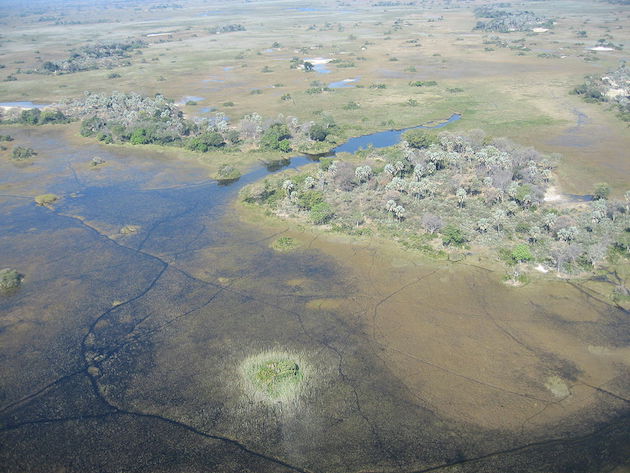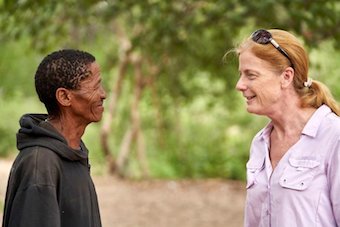Genetic research places the first human beings in the South African country. Christian scientists say the study is inconclusive and the debate about our origins will continue.
 Aerial image of the Delta of the Okavango river, in northeast Botswana. / Wikimedia Commons, CC
Aerial image of the Delta of the Okavango river, in northeast Botswana. / Wikimedia Commons, CC
In northern Botswana and 200,000 years ago. That is the new explanation of the origin of the modern human being, that comes from a genetic research published this October by Nature magazine, led by Vanessa Hayes of the Garvan Institute of Medical Research in Sydney.
According to the publication, the desert region of Makgadikgadi-Okavango, south of the Zambeze River, in the north of what is now known as Botswana, would have been the starting point of the current human civilization. The good conditions for the growth of vegetation and the wealth of natural resources that it had about 2,000 centuries ago would have been the perfect environment.
The study has been carried out from samples of mitochondrial DNA from different groups, that currently inhabit the southern region of Africa, such as the Khoisan.
“The fossils found so far pointed to an origin in East Africa, while studies based on genetic analysis had suggested that modern humans emerged in South Africa”, Hayes said.
“GENERAL AGREEMENT ABOUT AFRICAN ORIGIN”
Until two years ago, there was a general consensus in the scientific community that placed the origin of humans in East Africa, in the area where Ethiopia is today, also 200,000 years ago.
The discovery of the remains of three young adults of 315,000 years old in Jebel Irhoud, Morocco, in 2017, had raised new conclusions.
“There is a general agreement among scientists about the African origin of the human species. However, there are wide debates about in which region it would be necessary to place its origin”, says the doctor in molecular biology and coordinator of the Spanish Center of Science and Faith of the Faculty of Theology SEUT, Pablo de Felipe.
In fact, “the place to which this research refers would be the place to which the oldest ancestors of today's humans would be, but that does not mean that they arose there, they would have dispersed from that place, but they could have come from somewhere else”, he adds.
"THERE IS MUCH TO DO"
The biologist and theologian Antonio Cruz points out that with Hayes' publication “the discrepancies that arise with each new discovery are revealed, forcing the rewriting of previous approaches".
“The problem increases when other human fossils, not from Africa but from Eurasia are taken into account, such as the Denisova man who supposedly lived between a million and 40,000 years ago; or Dali's man, also dated 300,000 years old. This would destroy the hypothesis of the African origin of man, because it would show that it already existed in other continents”, says Cruz.
According to De Felipe “the fact that there are older fossils at the other end of Africa, may mean that human origins are still older than this population”.
“The problem with some of those fossils, such as those dated 300,000 years ago in Morocco, is that it has not been possible to recover DNA from them to study whether or not they are related to the population of Botswana described in that article. The population of Morocco could be a side branch of the human tree unrelated to our direct ancestors. There is clearly a lot to do”, he stresses.
BETWEEN DNA AND FOSSILS
The claim made by the study on the value of DNA to determine certain conclusions about the origin of humans, leads to the question of what is the place of paleontological discoveries and fossils.
 Scientist and University of Sidney proffesor, Vanessa Hayes, talks with a memer of the Ikun Ikunta tribe. / Twitter @GarvanInstitute
Scientist and University of Sidney proffesor, Vanessa Hayes, talks with a memer of the Ikun Ikunta tribe. / Twitter @GarvanInstitute“We should not have to choose. A global response to the problem of human origins should integrate all the knowledge we can gain. No evidence can be neglected”, says De Felipe. He argues that “we have to work with all available data. These discrepancies suggest that we still do not have a global vision, but partial studies”.
Meanwhile, Cruz points out that both fossils and the genetics “are based on previous assumptions”, and they are in conflict because “the former tend to give dates older than the latter (...) The confusion grows when, with almost each new fossil discovery, the previous schemes are usually modified”.
According to De Felipe, the novelty of sudying “so many people”, about 1,200, “has allowed us to discover many new mitochondrial genomes and be able to make the greatest comparison until now”.
However, there has also been criticism “for relying solely on the mitochondrial genome, a very small part of human genetic information, which is easier to study than the entire genome, but which gives information on the maternal line, not paternal, and because it has focused on one region, not including genomes from other areas”.
“Some researchers believe that other African regions that could have other lineages as old or more, should also be analyzed in detail”, he explains.
NOT CONCLUSIVE STUDY
Beyond the discussion it has generated, the different opinions agree that the study does not close the debate about human origins.
“This work is not going to be too relevant, because it clashes with the opinions of many other evolutionary scientists around the world”, says Cruz, who also emphasises that the article "has already been described as simplistic”. “It has been said that the question of human origins remains open; that there were probably many exits of Homo Sapiens outside Africa and many entrances, that is, a population flow in both directions”, he points out.
Furthermore, “the work has an insufficient sampling problem; relying only on mitochondrial DNA is a weak point, and it is not correct to assume that the current distribution of lineages is the same as that of 200,000 years ago”, Cruz explains.
Because of all this, he says, “it is not at all conclusive, but it adds fuel to the fire of human origins”.
De Felipe underlines that "this is a hot topic because of the deeper and deeper study of the genome of current populations, and the possibility of recovering DNA from ancient bones and studying their genomes”.
“The combination of both sources of information, helps to reconstruct the family tree of the human family”, he adds.
De Felipe believes that, “although it is difficult that the main thing about the genetic connection between all current people on Earth and about their ancestral origin is in Africa tens-hundreds of thousands of years ago, changes, the details about the place and time of origin, the different emigrations outside of Africa and the population mixes, are current hot topics and hopefully there will be many new developments in the near future”.

Las opiniones vertidas por nuestros colaboradores se realizan a nivel personal, pudiendo coincidir o no con la postura de la dirección de Protestante Digital.
Si quieres comentar o